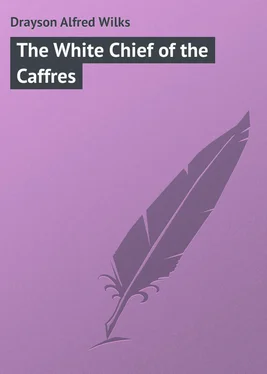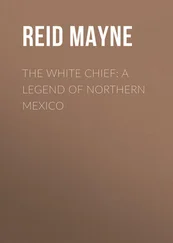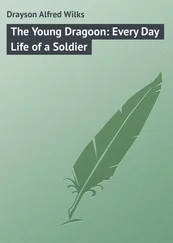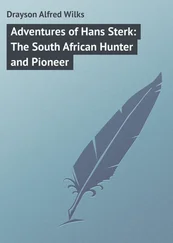Alfred Drayson - The White Chief of the Caffres
Здесь есть возможность читать онлайн «Alfred Drayson - The White Chief of the Caffres» — ознакомительный отрывок электронной книги совершенно бесплатно, а после прочтения отрывка купить полную версию. В некоторых случаях можно слушать аудио, скачать через торрент в формате fb2 и присутствует краткое содержание. Жанр: Прочие приключения, foreign_prose, на английском языке. Описание произведения, (предисловие) а так же отзывы посетителей доступны на портале библиотеки ЛибКат.
- Название:The White Chief of the Caffres
- Автор:
- Жанр:
- Год:неизвестен
- ISBN:нет данных
- Рейтинг книги:4 / 5. Голосов: 1
-
Избранное:Добавить в избранное
- Отзывы:
-
Ваша оценка:
- 80
- 1
- 2
- 3
- 4
- 5
The White Chief of the Caffres: краткое содержание, описание и аннотация
Предлагаем к чтению аннотацию, описание, краткое содержание или предисловие (зависит от того, что написал сам автор книги «The White Chief of the Caffres»). Если вы не нашли необходимую информацию о книге — напишите в комментариях, мы постараемся отыскать её.
The White Chief of the Caffres — читать онлайн ознакомительный отрывок
Ниже представлен текст книги, разбитый по страницам. Система сохранения места последней прочитанной страницы, позволяет с удобством читать онлайн бесплатно книгу «The White Chief of the Caffres», без необходимости каждый раз заново искать на чём Вы остановились. Поставьте закладку, и сможете в любой момент перейти на страницу, на которой закончили чтение.
Интервал:
Закладка:
Inyati, talking to me afterwards about the moon, said, “Your white people believe it always the same moon.”
“Yes,” I replied, “they know it is the same.” Inyati said, “I have often found that what is true cannot be made by words to appear to be as true as something else that is false. Talking is no good.”
Finding that Inyati now talked to me on many occasions, I took the opportunity of asking him one day what had become of the things that they had taken from the men; for I knew there were some guns and other things which might be of use. He told me that most of them were buried in a hole near a kraal some miles away; and that the people were afraid of these things, thinking that they might blow up and kill them. I told Inyati there was one thing I knew of amongst these which would be of great use if we could find it, and I could show him what to do with it. I described this to him, and he then told me that this and a few other things were at his kraal, and he would show them to me. That evening he took me to his kraal, and lifting up a wicker door, he showed me several articles in a hole below. I there saw what I wanted, and took from the hole a pair of opera-glasses in a leather case. I then went with Inyati to a little hill near, and seeing about two miles off some Caffres, I asked him who they were.
He said they were too far off to recognise.
I then adjusted the glasses for my focus and told him the names of the Caffres, whom I knew, and then handing him the glasses showed him how to use them.
I never saw greater astonishment than that of Inyati when he looked through the glasses and perceived distant objects as plainly as though they were near. He never seemed tired of looking, first at distant then at nearer objects. He asked me what I called them, and I said in English, “opera-glasses.” He shook his head at this, and then said in Caffre, “I shall call them ‘bring near.’” He went back to his kraal and seemed deep in thought, and every now and then looked at the glasses, which he preserved with the greatest care.
On the following morning he assembled all the men, and had a council. He told them that I had shown him the use of a thing that was like “ tagata ” (witchcraft); and that this thing, though quite harmless, was wonderful. He said that people and things at a distance were instantly brought close to you, and you could almost touch them with your hand. At first the older men seemed inclined to disbelieve, but Inyati said, “What I tell you, that I can show.” There was one old man who had the reputation of being a rain-maker, and was called Amanzinina, who would not believe what Inyati told him. This old man had always disliked me, and was one of those who had expressed the wish that I should be assagied. He said that I might practise witchcraft, and that this thing which made people come near was and could be only due to witchcraft; as it was impossible to be anything else. He suggested that the glasses should be burned, and that if I were burned too it would be all the better for the tribe.
Inyati answered him; but a great many of the men who were afraid of Amanzinina, agreed with him as to burning the glasses, though they said that I might be spared. At first I felt disposed to laugh at the nonsense spoken by this old man, but when I found how important his remarks were considered by the men, I was somewhat alarmed. Inyati, however, answered Amanzinina well, and said that I had nothing to do with this “bring near”; that it was made by white men, just as Caffres made assagies; that it was a thing which white men used everywhere; and that I, having seen men use it, knew what it was for, and that witchcraft had nothing to do with it. After a time the chief convinced all the men except Amanzinina, who would have nothing to do with the glasses, and would not even look through them.
The astonishment shown by the men when they looked through the glasses was quite equal to that which had been displayed by Inyati: they thought it wonderful, and several of them, seeing people at a distance, put their mouth to the glasses and shouted, believing that this would make their voices heard. They could not understand why it was, that if they could see people close, by aid of the glass, they could not also make them hear. At length, however, these glasses were looked on as a valuable treasure, and Inyati never went out without them. People came from great distances to see them, and every one was equally surprised at their use.
It was now the time when the crops of mealies and other corn were coming up, and a circumstance now happened which enabled me to judge of the manner in which these people, among whom I had cast my lot, would fight against an enemy. From a village about ten miles from us, news was brought that two bull-buffaloes, very savage and cunning, had taken up their quarters in some thickly wooded ravines near the corn-ground of the village. Each night these buffaloes used to come from the bush, break through the fences, and eat the young corn. This meant a famine for this kraal, for the people depend on mealies for their food during the year. Aid was wanted from our kraal and from others in order to hunt these buffaloes and to kill them. In two days the hunting party had been assembled, and consisted of about five hundred men, armed with assagies, for the knob-kerrie was no use against a buffalo. I obtained permission to join this party, and we had assembled in the evening at the distant kraal, and were to hunt on the following day.
It was decided that there should be a great dance performed by the warriors before we attacked the buffaloes. There were two kinds of dances practised by these Caffres, one before a war was undertaken, the other before a hunt. The dance was performed by the men, who formed in a circle, and stood three deep. The dance consisted merely of stamping on the ground, first with one foot then with the other, keeping time to a song. The effect of about five hundred heavy feet striking the ground at the same instant was grand, and the shouts of the men became louder and louder, as their excitement increased. In the centre of the ring one or two men would occasionally dash about, quivering their assagies, and pretending to throw them; then, almost falling on the ground, they would suddenly spring in the air, dart from side to side, and rush forward making movements of stabbing an enemy. The proceedings of these men were carefully watched, for they were known as the quickest movers and fastest runners in the tribe, and their skill in dodging an assagy was such that no man ever had a chance of hitting them in the games they played with blunted assagies. The dance lasted about two hours, and we then lay down to sleep, some in the huts and others on the ground.
At daybreak we all got up, and having employed a short time in sharpening our assagies, we assembled in groups to receive our orders.
The buffaloes were known to be concealed in a dense ravine about two miles from the kraal. There were two parts of this ravine whence the animals could escape, and it was decided that they should be driven towards that end nearest the kraal. About one hundred men were told off to go round the top of this ravine and to enter at the far end, so as to drive the buffaloes before them. About twenty boys were placed round the top of the ravine, whose duty it was to watch the buffaloes and to give notice where they were in the bush. I was told to go with these boys, but I begged Inyati to let me go with him and to join the party who were to attack the animals when they were driven out into the open country. With a smile Inyati consented, and asked me if my assagies were sharp. I showed them to him, and having felt them he nodded his approval, and then assembling his men we marched off to our station.
When we had reached the top of the ravine, we were placed in a semicircle and then concealed ourselves. A party of about a hundred men then took up their position near the top of the ravine, and their duty was to run between the buffaloes and the ravine immediately they broke cover, so as to cut off their retreat, and thus to prevent them from breaking back, and dashing through the beaters. Everything was done in silence; a wave of the arm by Inyati was sufficient for an order, his hand held upright halted the whole party. Since then I have seen English soldiers at drill, but I never saw better discipline than I saw among these Caffres. When we were all placed in the positions allotted to us, a shrill whistle was the signal that all was ready, and the men at the far end of the bush advanced, beating the bushes and making a noise so as to frighten the buffaloes, and make them retreat from the ravine in the required direction. The boys on the top of the ravine soon saw the animals moving through the bush, and signalled to us, imitating their movements. It was amusing to see how well these boys acted. Two of them pretended to be buffaloes, and when the buffaloes moved on they moved; when the buffaloes stopped and listened, the boys stopped and imitated every movement, twisting round and round, just as these animals do when alarmed.
Читать дальшеИнтервал:
Закладка:
Похожие книги на «The White Chief of the Caffres»
Представляем Вашему вниманию похожие книги на «The White Chief of the Caffres» списком для выбора. Мы отобрали схожую по названию и смыслу литературу в надежде предоставить читателям больше вариантов отыскать новые, интересные, ещё непрочитанные произведения.
Обсуждение, отзывы о книге «The White Chief of the Caffres» и просто собственные мнения читателей. Оставьте ваши комментарии, напишите, что Вы думаете о произведении, его смысле или главных героях. Укажите что конкретно понравилось, а что нет, и почему Вы так считаете.












